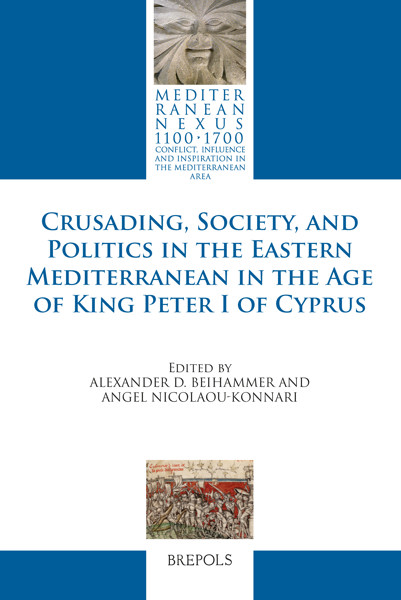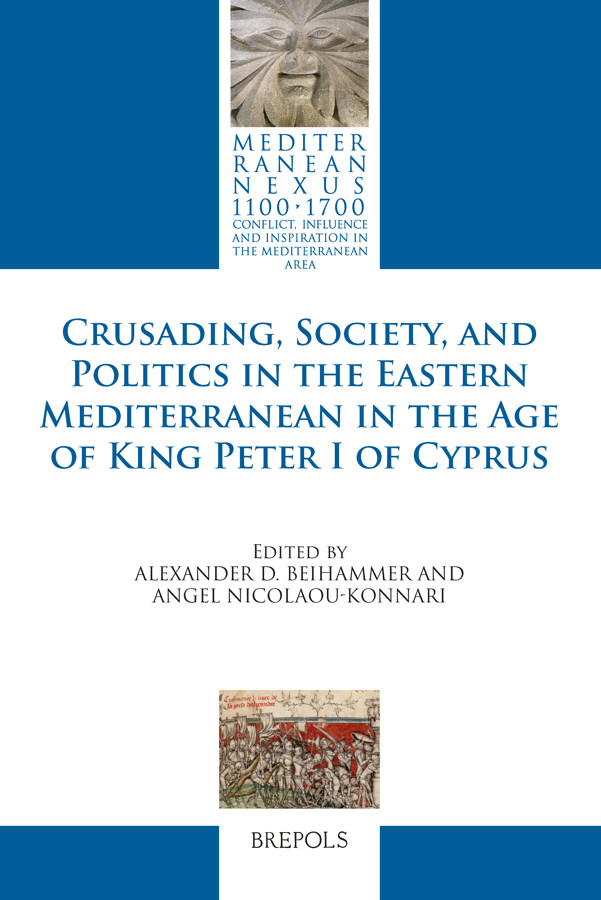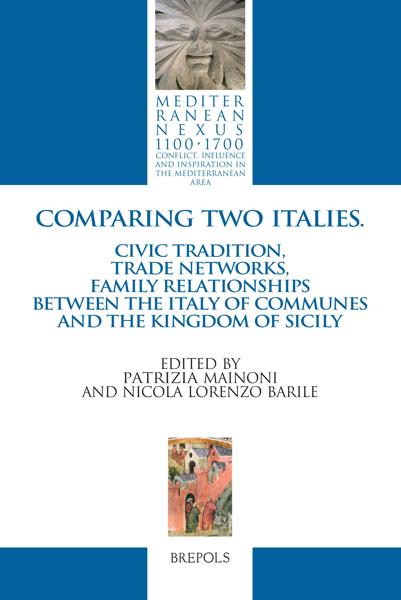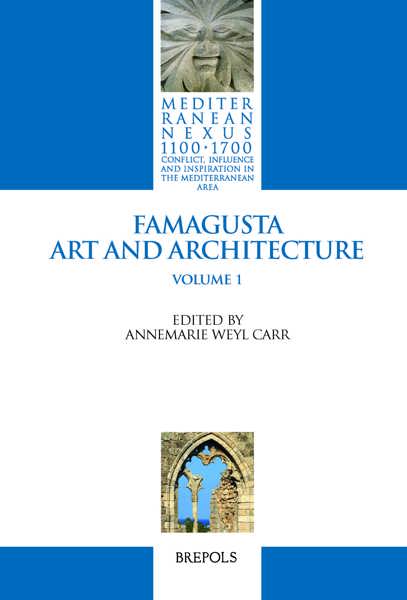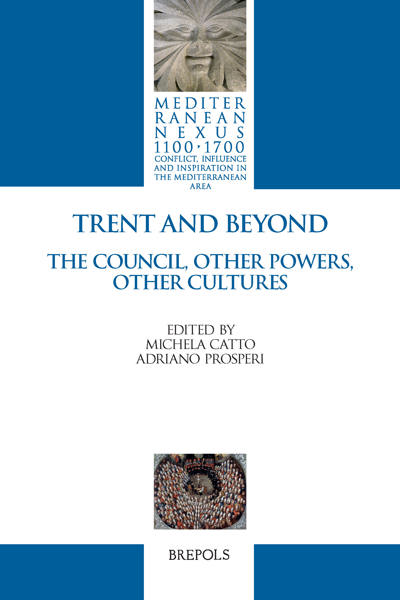
Crusading, Society, and Politics in the Eastern Mediterranean in the Age of King Peter I of Cyprus
Alexander Beihammer, Angel Nicolaou-Konnari (eds)
- Pages: 630 p.
- Size:156 x 234 mm
- Illustrations:38 col.
- Language(s):English, French
- Publication Year:2023
- € 115,00 EXCL. VAT RETAIL PRICE
- ISBN: 978-2-503-59856-7
- Hardback
- Available
- € 115,00 EXCL. VAT RETAIL PRICE
- ISBN: 978-2-503-59857-4
- E-book
- Available
King Peter I of Lusignan of Cyprus, his crusading policy in the Eastern Mediterranean against the Turkish beyliks of Anatolia and the Mamluk sultanate of Egypt, and the Byzantine-Western European power politics.
“Overall, this important volume calls the attention of students and scholars to a bigger, interconnected medieval world, a world consisting of different micro-worlds, in which the martial figure of King Peter I won and lost battles, surrounded by other prominent leaders of his time and the vast, anonymous crowd of his humble contemporaries in Cyprus and elsewhere.” (Chrysovalantis Kyriacou, in Sehepunkte, 23/5, 2023)
“This volume, eminently useful to students of King Peter I of Cyprus, will also satisfy those wishing to understand the wider Mediterranean world that he lived in.” (Nicholas Coureas, in The Journal of Religious History, Literature & Culture, 10/1, 2024, p. 138)
Alexander Beihammer, Heiden Family Professor of Byzantine History, University of Notre Dame, has published widely on the relations between Byzantium and the Muslim World, the Seljuk Turks, and the transformation of Asia Minor.
Angel Nicolaou-Konnari is Associate Professor of the History of Hellenism under Latin Rule at the University of Cyprus. Her research focuses on various aspects of the history of Lusignan and Venetian Cyprus.
The King of Cyprus, Peter I of Lusignan (1359-1369), was one of the most fascinating figures in the history of the Latin East and the later crusades. He was involved in European power politics, his crusading activities brought him into conflict with the Turkish beyliks of Anatolia and the Mamluk sultanate of Egypt, and his rule was closely linked with broader developments in the Eastern Mediterranean, such as the decay of Byzantium, the East-West schism, and the beginning of the Ottoman expansion in the Balkans. His adventurous life constitutes a captivating case study of court life, feudal and chivalric ethos, and political culture in the fourteenth century. This volume investigates developments in the Eastern Mediterranean before and during the reign of Peter I from a comparative perspective. It consists of five parts, which treat the political, diplomatic, and ecological context of the crusading movement in the time between the fall of Acre (1291) and the sack of Alexandria (1365), Peter I’s crusading policy and the Alexandrian crusade, Cypriot society and court life in the time of Peter I, the situation in Muslim-Turkish Anatolia, the second target of King Peter’s crusading policy, and, finally, Byzantium, its encounter with the Turks, the schism of the Churches, and theological trends in the time of the Hesychast Controversy.
Alexander D. Beihammer, Angel Nicolaou-Konnari, Preface
Angel Nicolaou-Konnari, The Life and Reign of Peter I of Lusignan (1329–69, crowned 1359). Chronology
Introduction
The Sources and the Context
Angel Nicolaou-Konnari, Peter I of Lusignan (1324–69, 1359) in Historical Sources and Modern Popular Culture
Angel Nicolaou-Konnari, Appendix A: The Life and Reign of Peter I of Lusignan (1329–69, 1359) according to Leontios Makhairas and William of Machaut: A Thematic Comparison
Kakia Niκolaou, Appendix B: (Tentative) Psychiatric Assessement of Peter I of Lusignan (1329–69, 1359).
Alexander D. Beihammer, The Sack of Alexandria (1365), the Crusading Movement, and the Eastern Mediterranean in the First Half of the Fourteenth Century
Part I. From Acre to Alexandria – The Politics and Ecology of Crusading
Mike Carr, Cyprus and the Crusades between the Fall of Acre and the Reign of Peter I
Charalampos Gasparis, Crete, 1357–67: A Stronghold for Venetian Diplomacy and Crusading in the Eastern Mediterranean
Johannes Preiser-Kapeller, A Climate for Crusading? Environmental Factors in the History of the Eastern Mediterranean during the Life and Reign of Peter I of Cyprus (1328–69)
Michalis Olympios, Angevin and Lusignan Visual Claims to the Crown of Jerusalem: Parallel Lives?
Part II. Peter I’s Alexandrian Crusade (1365) – Event and Context
Peter Edbury, Chris Schabel, The Papacy and King Peter I of Cyprus
Chris Schabel, Appendix A: Pope Innocent VI’s Letters Concerning the Succession of King Peter I of Cyprus
Chris Schabel, Appendix B: Pope Urban V’s Letters Concerning King Peter I of Cyprus and the Crusade
John France, The ‘Military Revolution’ and the Eastern Mediterranean in the Age of Peter 1 (1359–69)
Clément Onimus, Peter I of Lusignan’s Crusade and the Reaction of the Mamluk Sultanate
Angel Nicolaou-Konnari, ‘Le roy de Chippre de renon’: The Depiction of Peter I of Lusignan in French Literature
Part III. A Crusader Kingdom – Cypriot Society before and after Peter I
Miriam Salzmann, Stability or Chaos? Power Élites in Lusignan Cyprus between the 1360s and 1390s
Gilles Grivaud, Le roi Pierre Ier et son conseil
Johannes Pahlitzsch, The Suriani in Lusignan Cyprus until the Murder of Peter I (1369): Terminology, Legal Status, and the Curia Surianorum
Part IV. The Rise of a New Power – Muslim-Turkish Anatolia
Rhoads Murphey, The Long Prose ‘Epic’ of Sarı Saltuk Dede (fl. circa 1260 to 1298) as a Source for Understanding the Style and Context of Crusading Warfare in the Late Thirteenth-Century Near and Middle East
Romain Thurin, ‘Wolves and Sheep drank and grazed together’: A Case Study on the Formation of the Anatolian Beyliks
Daniele Baglioni, Italian Vernaculars as Diplomatic Languages in the Medieval Levant
Part V. The Schismatic Ally – Byzantium between Islam and Unionism
Alexander D. Beihammer, Crusade, Civil Strife, and Byzantine-Turkish Coalitions in the Time of Emperor John VI Kantakouzenos (1341–54)
Sebastian Kolditz, John V Palaeologus in Rome
Charles Yost, Anti-Palamism, Unionism, and the ‘Crisis of Faith’ of the Fourteenth Century
Alexis Torrance, Cyprus in the Late Byzantine Theological Landscape, with Special Reference to the Palamite Controversy
Index
